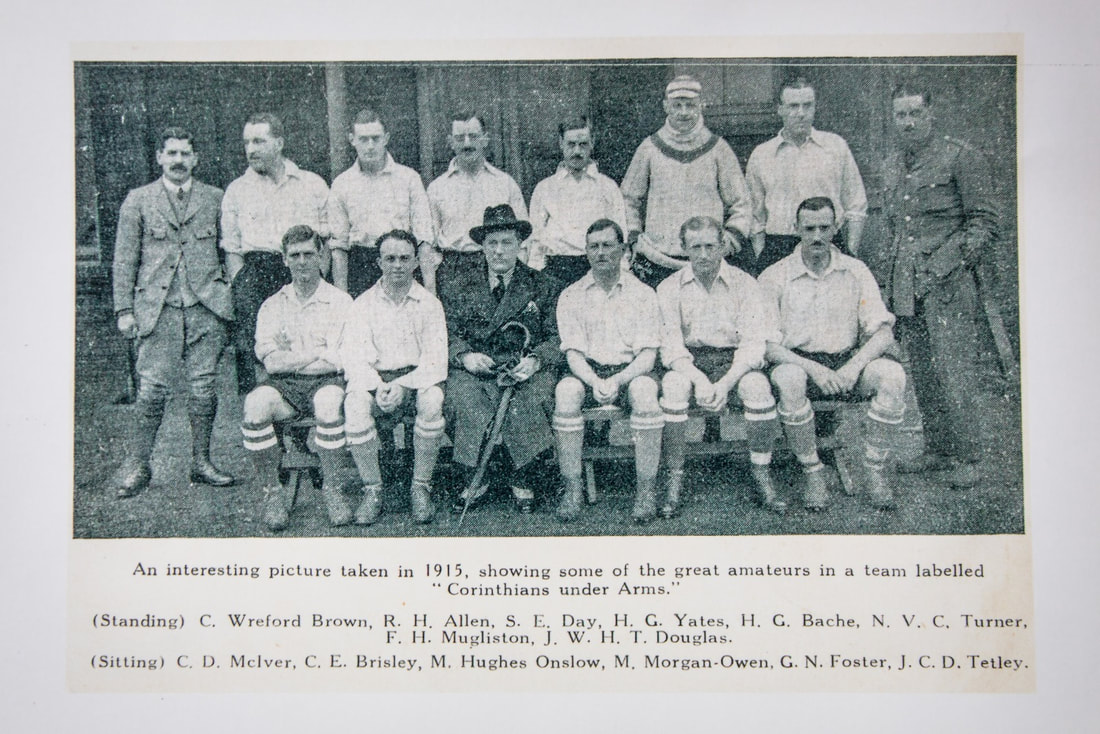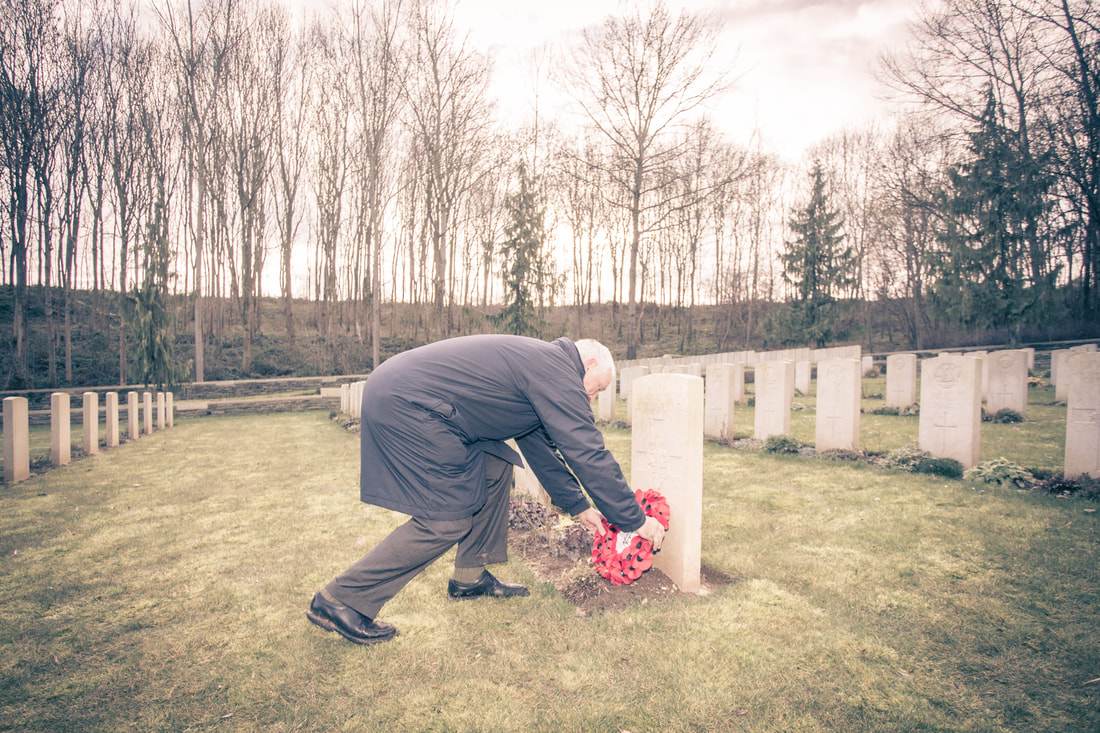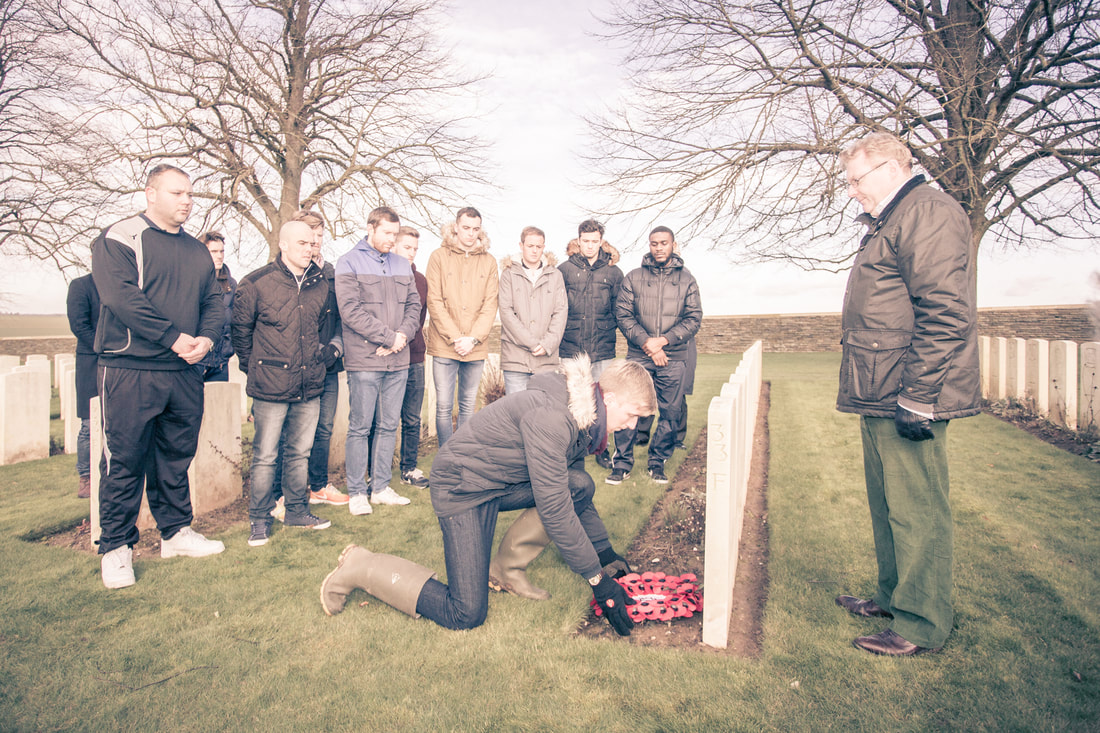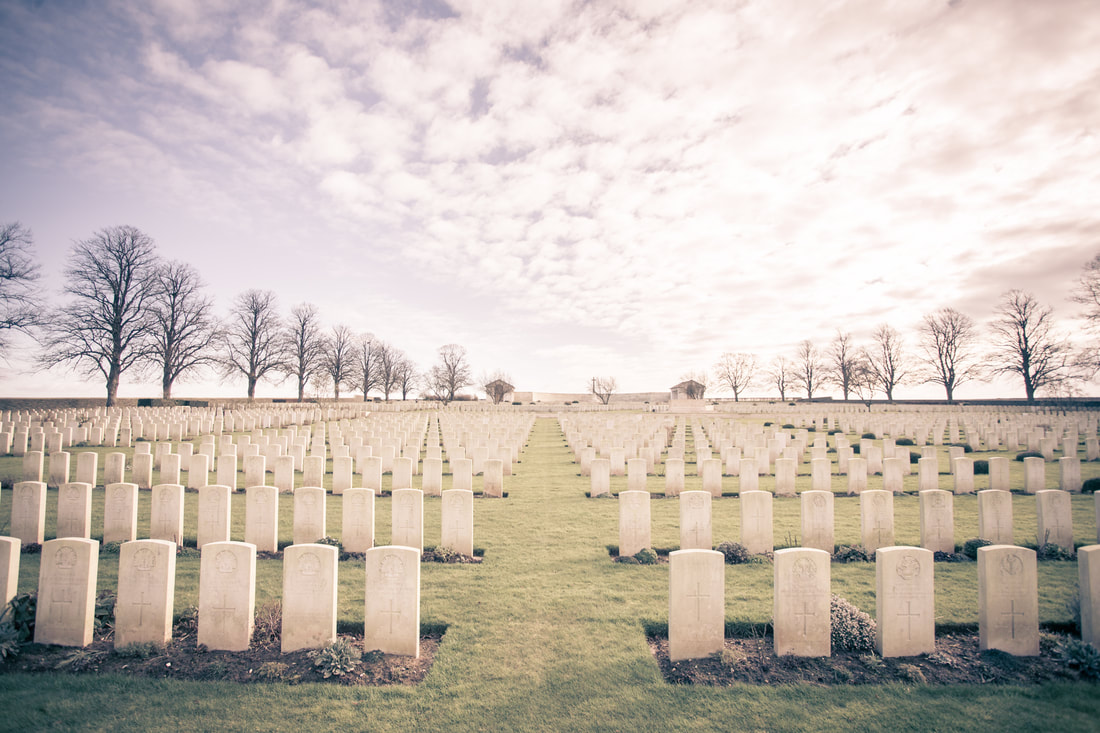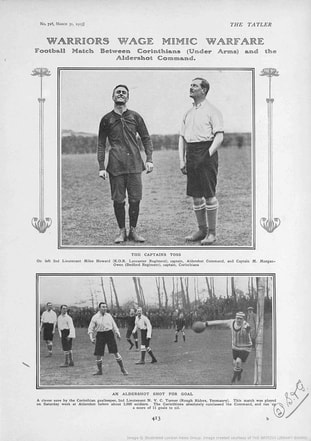
As soon as the Amazon reached Buenos Aires four team members, G.E.C Cockburn, A.M. Wilkinson, J.C.Tetley and J.H. Fosdick, immediately disembarked and took the first ship home. All were reserve officers in the Army. The others waited a few days then returned on another Royal Mail boat arriving back in London on 30 August. All the Corinthians then joined up.
Three of the footballers on the Amazon were killed in the war, among the 32 Corinthians who died along with 72 members of their brother club the Casuals, making a total almost certainly more than any other association football club in the land.
In February 1915 a team of "Corinthians under Arms" played Aldershot Command in a friendly at the Queen's Club in west London. The team sheet helps explain why the toll of Corinthians and Casuals was so high. 9 of the Corinthians' team were officers. Thanks to their Public School background they, and many other Corinthians and Casuals who volunteered, were almost automatically commissioned. It was the junior officers who led their soldiers "over the top" from the trenches - and were the first to die.
Their stories are varied and touching.
One of the first casualties was Lt John Hyland Fosdick in the Rifle Brigade; a product of Charterhouse and Cambridge, where he'd been in the Officers' Training Corps. Clearly a player of promise, aged 19, he'd invited by Corinthians to join the ill-fated visit to Argentina; he played for Aldershot Command in the match at Queen's Club. Soon he was in the trenches at Hooge, Flanders, helping to defend the enormous Hooge crater, after the allies had dug a tunnel under German lines, then filled it with explosives and blew it up. The Germans attacked and tried to regain the lost position using flame throwers. Fosdick was struck in the head by a piece of shrapnel on 30 July 1915 and died the next day.
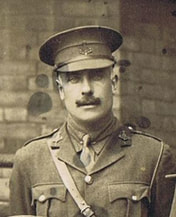
Rowlandson offered his house to the Red Cross when war was declared and was commissioned into the Princess of Wales Own, part of the Yorkshire Regt He went to the front in April 1915 and fought at Ypres on the Somme where he was promoted Captain. He was reputed to have led his men towards the German trenches carrying a walking stick with a red handkerchief tied to the end which he held above his head so his men could see him. He was killed in action by a German grenade, on 15 Sept 1916, aged 33, and postumously awarded the Military Cross. A fellow officer wrote: "I have always thought him the finest type of Englishmen I have ever known, and his death was just as fine as his life. He died where of all places I think he would have chosen, if it had to be - on the German parapet at the head of his men."
Major Cuthbert Everard Brisley was a considerable centre forward, ex-Lancing College; after Cambridge in 1910 he was called to the bar; played 35 games for Corinthians before the war, scoring 34 goals. He also scored for Corinthians on their first visit to Brazil in 1910 and was on the ill fated trip in 1914. He also played and scored in the Aldershot match. After enlisting in the Artists' Rifles he became one of the early instructor pilots in what became the Fleet Air Arm, serving in the Dardanelles and Romania . On 13 July 1918, aged 32, he was flying with a trainee in an open bi-plane. He attempted to loop the loop and fell out - to his death. The trainee pilot was unable to control the plane, crashed and died.
John Charles Tetley was also on the ill-fated tour to Argentina, and as a reserve officer came straight back to join up. As a 22 year old 2nd Lieutenant in the Grenadier Guards he played at full back in the Corinthians under Arms match at Aldershot. Previously he'd had 22 games for Corinthians. As an acting Captain, trying to recapture the notorious Passchendale Ridge, he was killed on 9 Oct 1917. His body was found and his personal effects were listed simply as a cigarette case, a damaged watch and a Freemasons' certificate.
A tragic death was 2nd Lieutenant Leonard J. Moon. After school at Westminster he went on to Pembroke College, Cambridge, in 1897, aged 19 and played for the university at both football and cricket; also played 4 tests for England as a batsman. He played 21 matches for Casuals and 66 for Corinthians. Commissioned early in the war he spent two months at the front in France with the 10th Devons;, then, in Nov 1915 went to Salonika, Greece where the regiment spent months in support of Serbia in a bid to encourage the Greek government to join the war. It was rumoured that he had not led his men in the trenches as he should. 0n 23 November 1916 he wrote to his commanding officer: "I seem to have given the 10th Devons a bad name for which I am truly sorry. For God's sake don't let men die for saying anything against me. I have not the slightest idea who started the rumour." The same day he shot himself.
Harold Godfrey Bache was at King Edwards School, Birmingham, one of seven brothers. He went on to Caius, Cambridge where he captained the university football team, once scoring 4 goals in a 7 - 2 defeat of Corinthians. He also played tennis against Oxford. He went on several Corinthians tours including the USA and Canada in 1911 where he scored 38 goals in 18 matches; altogether he played 43 games for Corinthians, scoring an astonishing 95 goals, including 2 in the game against Aldershot Command ; he also won 7 English amateur caps.
Later he started teaching at Lilancourt Univ in France. In 1914 he immediately joined up and was commissioned in the Lancashire Fusiliers. In Sept 1915 it was reported that a barn in which his soldiers were billeted at Ypres on the Belgian front was hit by German shells, killing 20 and wounding 27. 2nd Lieutenant Bache ran to help. He was unhurt despite shells exploding all around him. But on 16 Feb 1916 on the Comines canal bank at Ypres he was killed by a sniper. He was 27.
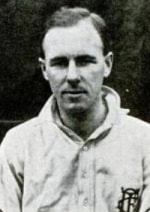
One of the Corinthians' most formidable players was centre forward F.N.S.Norman Creek. He was born in County Durham in January 1898 and was first spotted playing for Darlington G.S. He joined up while still in his teens, serving first as a 2/Lt in the Durham Light Infantry and was then seconded to the Royal Flying Corps as an Observer Flying Officer. It was a particularly dangerous job, in an open cockpit plane, flying low over enemy lines observing and photographing.
In May 1918 he was awarded the Military Cross for "conspicuous gallantry and devotion to duty. He carried out several reconnaissances of enemy aerodromes and railways and obtained valuable information often under the most difficult weather conditions. On one occasion he took several photographs of an enemy aerodrome though he was attacked by an enemy machine and subjected to anti-aircraft fire."
He was awarded a permanent commission immediately after the war but when the RAF chose to demob him he went on to Cambridge. He immediately won a blue for football in 1920 and another, after a year out for injury, in 1922. He began playing for the Corinthians in 1919 and was a regular until the 1930s. In that time he made 146 appearances and scored 152 goals, many of them in FA Cup ties against professional clubs. In Feb 1923 he scored 10 goals for the Corinthians against the Army at Crystal Palace; Corinthians won 15 -2. He was picked once for the full England team, on 10 May 1923, scoring in the 4 - 1 win against France, and won five England amateur caps. For good measure he played five times for the Casuals, scoring 3 goals.
For a short period after the war he taught at St Andrew's Prep school in Eastbourne. A school history recalls his role in the Royal Flying Corps and a favourite question, diverting the maths' class, "Tell us how you bombed the Kaiser ?"
From 1923 he taught Geography and "games" at Dauntsey's School in Wiltshire and also played
cricket for Wiltshire. He wrote a number of coaching books, and also the definitive "History of the Corinthian Football Club" in 1933, where he is disarmingly modest about his own achievements: "It was not long before Creek scored as a result of a fine combined movement in which Hegan and Jenkins were prominent", Corinthians 3 Manchester City 3, F.A.Cup, 9 Jan 1926; Crystal Palace, attendance 30,000. He was also a cricket writer for the Daily Telegraph.
Perhaps it was no surprise that, when war was declared in 1939, he joined up again, aged 41, and was re-commissioned into the RAF where Flight Lieutenant Creek spent the war years helping train recruits. In 1943 he was awarded the MBE.
After the war, having finished playing, he was on the staff of the Football Association as Assistant Director of Coaching. He became manager of the England Amateur team. He also managed the Great Britain football team at the 1956 and 1960 Olympics. Brian Wakefield, long time Corinthian-Casuals player, manager and committeeman, was in the 1960 Olympics squad; he remembers Norman Creek as a gentle and good humoured manager, "never a shouter or a screamer. I wish I'd talked to him about his war record." This great Corinthian died on 26 July 1980, aged 82.
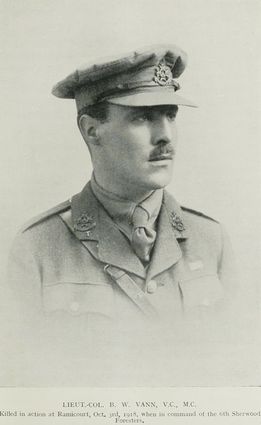
In April 1915 at Kemmel on the French front Lt Vann was soon tested: "When a small advance trench which he occupied was blown in, and he himself was wounded and half buried, he showed the greatest determination in organising the defence and rescuing buried men under heavy fire, although wounded and severely bruised he refused to leave his post until directly ordered to do so" For that bravery he was awarded the Military Cross.
A year later he won a second MC, "for conspicuous gallantry in action. He led a daring raid against the enemy's trenches, himself taking five prisoners and displaying great courage and determination."
By 1918 he was acting Lt/Col, commanding 1/6th Battalion of the Sherwood Forresters, very much in the front line. The citation tells the story: "On 28 September he led the battalion across the St Quentin Canal through very thick fog and under heavy fire from field and machine guns...The whole attack was held up by fire of all descriptions from the front and right flank...Col Vann rushed up to the firing line and with the greatest gallantry led the line forward...... Later in the day he rushed a field gun single handed. The success of the day was in no small degree due to the splendid gallantry and fine leadership displayed by this officer"
Lt/Colonel Vann was awarded the Victoria Cross, the highest award for valour. Four days later on 3 October 1918 at Ramicourt he was shot dead by a sniper. It was just five weeks before the end of the war. Bernard Vann was also twice mentioned in dispatches and won the French Croix de Guerre. He'd been wounded five times. He had married Doris Beck, a Canadian nurse, in December 1916. He never saw their son Geoffrey who was born in 1919.
Gilbert Eric Cockburn, who was on the 1914 boat to Argentina aged 20, was already a commissioned officer. He'd been at Repton then went straight to the Royal Military College at Sandhurst in 1912. He served the first year of the war with the 1st Royal Irish Fusiliers in France, then on to Salonika and back to France in 1917. He was wounded and twice mentioned in dispatches before winning the MC and a few months later the DSO, having taken over command of his battalion.
The citation of 17 Sept 1917 read: "At a most critical period of attack he was sent out with orders to clear up a situation, if possible, and to assume control of his battalion if he reached the front line. This he eventually succeeded in doing, under heavy fire, during which he was shot through the eye. Undeterred by this he stuck most gallantly to his mission, and although wounded again in the shoulder by a sniper he displayed the most magnificent fearlessness in reorganising and leading his men against the enemy's position.....His great initiative and the example of devotion to duty which he set to all ranks were beyond all praise"
Major Cockburn not only survived but played two games for Corinthians and five for Casuals in the 1920s. He was back on active service in 1939 in the Intelligence Corps as the start of World War Two. But at the infamous evacuation of Dunkirk in May 1940 he went "missing" and was later listed as having "died at sea" on 27 May, aged 46.
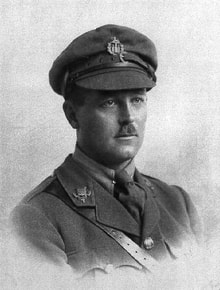
Aged 37 he enlisted in the Essex Regt four days after war was declared and quickly rose in the ranks as fellow officers were killed. After being invalided from Gallipoli he joined 11 Rifle Brigade as second in command. He took over for two months when his CO was gassed. and later, in October 1917, as a Lieutenant Colonel, commanded 10th Battalion the Rifle Brigade at the third Battle of Ypres, where he was awarded the DSO.
The citation reads: " When his battalion was in reserve, he moved it up to resist the attack, and held on to its position for two days. His steadfast determination to hold his ground against repeated attacks and under heavy fire largely contributed to restoring and keeping in hand the critical situation."
Later, on 28 March 1918, commanding the 11th Battalion during the German spring offensive at Cambrai, he was wounded again. He survived and went back to Repton but his playing days were over. A bullet ricocheting from his revolver handle had shattered the bone in his left arm, which was replaced by a silver rod. But that didn't prevent him from commanding 11th Battalion Derbyshire Home Guard in World War Two, aged 66.
As a player and committee man for both Corinthians and Casuals, and later President of Casuals, this distinguished war hero was very much involved in bringing the two clubs together in the years leading up to 1939. When the details of the merger were finally agreed , the minutes of the first AGM for Corinthian-Casuals F.C.. on 22 May 1939, record: "Lieutenant Colonel M.M. Morgan-Owen will be President." He remained in that role until he died in 1950. He was 77.
The patriotic spirit that so imbued Corinthians and Casuals in 1914 was very much in evidence when World War Two was declared in 1939. Many joined up and 11 members of the joint club were known to have been killed. Sir Stanley Rous, Secretary of the Football Association, suggested that Corinthian-Casuals organise a series of matches against teams from the armed forces "to help the chaps' morale". Maurice Coop, long time player and Secretary, remembered a game at Norbury that was interrupted by a German air raid. A bomb dropped next to the ground. The referee asked if the teams wanted to continue. "Of course", was the answer.
In a moving postscript to Corinthian deaths in the First War, when the modern day Corinthian-Casuals visited Brazil again in 2015, Corinthians Paulista, our hosts, wore on their shirts the names of the 1914 party who never did get to South America - Brisley, Rowlandson, Tetley, Fosdick and all.
Written by David Harrison with warm thanks and acknowledgements to Norman Epps, Llew Walker, Stuart Tree and especially to Rob Cavallini for his books on the Corinthians, Casuals and Corinthian-Casuals
